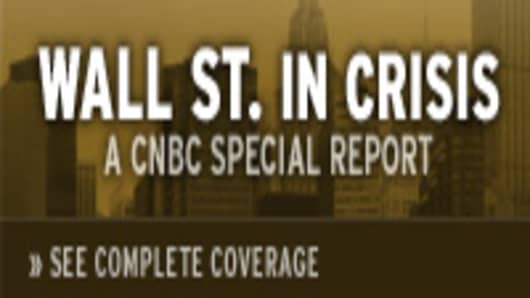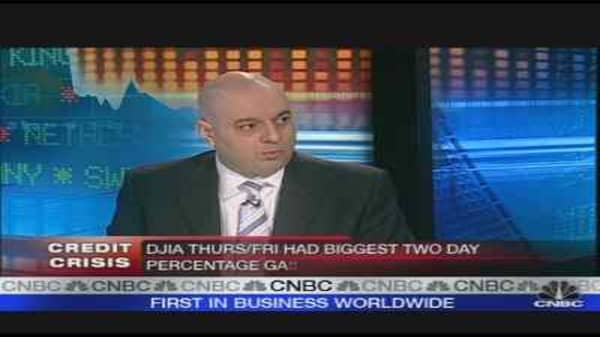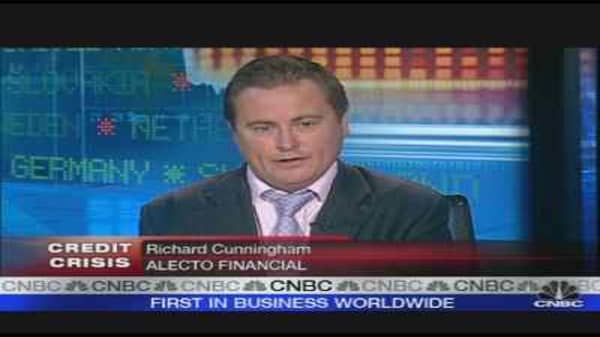A $700 billion taxpayer-funded bank bailout plan and decisions to ban short-selling across the globe will not mark the end of all the stock market troubles, experts warned on Monday.
The banking industry and hedge funds are likely to continue to suffer, and investors should be extra-cautious with their money, as the storm is far from over, market pros told CNBC. Find their comments below:
Take Cover
"If you have a storm going on, there's an umbrella that's going to protect certain segments that are systemically important. If you're going to go long, make sure that you are under the umbrella, and make sure that you are very close to the handle of the umbrella, so you don't get sprayed," Mohamed El-Erian, co-CEO of bond giant Pimco, told CNBC.
Temper Your Expectations
Remember, this is a bear market accompanied by a recession, says Hugh Johnson of Johnson Illington Advisors. “In those conditions, historically, you just don’t make a lot of money in the stock market.” His recommendation:Move into healthcare, utilities and consumer staple stocks. “But don’t look to make a lot of money in this kind of environment.”
Staying Away From Stocks
The impact of the bailout on the overall economy is negative, says Ascan Iredi from Deutsche Postbank Financial Services. "It has a deeper impact on companies outside the financial business," he says. "I’m quite negative on equities for the moment."
Uncertainty Remains
The impact of the US government's plan to backstop the financial markets is still unknown, but the fact that they are proactively managing the credit crisis is a positive sign, Ruben Van Leeuwen, economist at ABN Amro told CNBC.
Questioning Government Intervention
Government intervention is good when it comes in the form of "euthanasia". But governments should not be running the saved organizations or keeping them operating, like Northern Rock, Ralph Silva from TowerGroup said Monday. (See accompanying video.)
Super-Hero Bailout
The US government bailout plan is of such magnitude that it is "ready to save the world," Alain Schibl, founder & co-chairman of Duet Group, said.
Financial Fallout
"Quite frankly, I don't think anything major has happened," Dick Bove from Ladenburg Thalmann said when discussing Goldman Sachs' and Morgan Stanley's change of status.
"There's not going to be any change whatsoever in their investment banking operations. There's not going to be any change whatsoever in their trading operations. All they're doing is bringing in a new structure."
Banks Still Facing Losses
"It will have an impact on what is happening in the markets, but eventually it will not stop banks from realizing their losses," Marino Valensise, CIO of Barings, told CNBC, adding that they would have to sell assets at discounted prices.
Bear Market Still in Place
If the US bailout plan is the first step in the right direction, we didn't see the markets responding positively to news on Monday. The bear market is still firmly intact, Richard Cunningham, managing director at Alecto Financial, said. (See accompanying video.)
Short-Term Relief
The massive bailout plan proposed by the government will solve the financial crisis for the short term, Dodge Dorland, chief investment officer at Landor Capital Management said.
If the S&P gets through 1,275 shorter term and then 1,314; the Dow 11,66 and then 11,867; and the Nasdaq reaches 2,352 and then 2,474, the move to the upside will get much more serious, according to Dorland.
Negative News for Dollar
While the bailout package is set to be negative for the dollar in the short term, Thomas Harr, senior FX strategist, Standard Chartered said. He explains why the greenback will still rally in the medium term.
Challenging Times
While lawmakers rush to hammer out a bailout plan, Stefan Hofer, emerging market strategist at Julius Baer, warns that the worsening cyclical backdrop means greater challenges for emerging markets ahead.
European Reactions
The European Central Bank won't turn more dovish and consider interest-rate cuts in the wake of the US government's bailout plan, but will wait to see hard evidence of inflation easing, Jean-Michel Six, economist from Standard & Poor's told CNBC.
Cheap Buys in Asia
Use the current market weakness to increase exposure to undervalued Asian equities, advises Kerry Series, head of Asia Pacific equities at AMP Capital Investors.
From a long-term perspective, Series recommends investing in the Asian domestic demand story and basic resource stocks.





